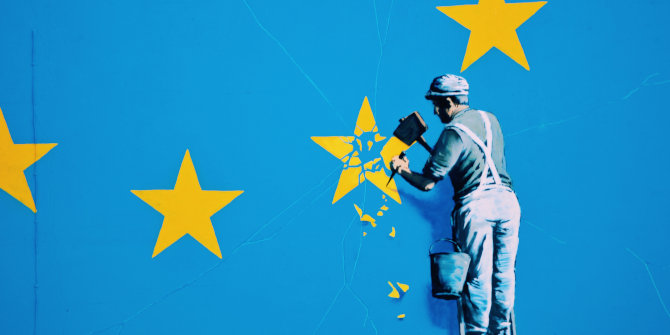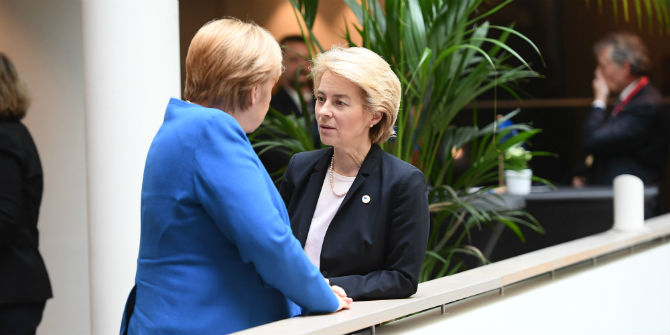Since January 2020, the UK has ceased to be a member of the EU. For the first time, an entire country has voluntarily left the bloc. Negotiations have started on the relationship between the UK and the EU after the current transitional period. But what about the current EU member states? Will some of them follow the British example? Hans Vollaard (Utrecht University) explains.
In June 2016, a majority of the eligible population in Britain voted in favour of leaving the EU. In the campaign, the desire to regain control over borders, laws and migration was an important motive. In particular, curtailment of migration was seen as an advantage of Brexit.
Without full participation in the Schengen area for free travel and in the monetary union, the exit didn’t seem that complicated. Moreover, can’t Great Britain perfectly stand on its own feet, economically and politically, many had asked? After all, the country still has a seat in the UN Security Council, worldwide ties with former colonies, an army with nuclear weapons, and a large financial sector. Also, the attitudes of the British towards the EU had never been all too favourable. The idea that the EU is a rather undemocratic bureaucracy made departure a logical way to express dissatisfaction with the EU.
However, leaving has been more difficult for the UK than expected, or suggested. Years of political tensions have been accompanied by uncertainty about the economic prospects and the rules applicable after the transitional period ends. These problems may not strengthen the desire in other EU member states to voluntarily withdraw their countries from the union. Nevertheless, Brexit will remain the exception even without those problems. There is no majority in any other member state in government, parliament or public opinion for a full exit from the EU.

How can that be? It is definitely not the case that dissatisfaction about the EU has been less elsewhere than in the UK. On the contrary, more Brits than Czechs, Italians, Greeks and Slovaks perceive EU membership as a good thing today. Stronger feelings for the EU outside the UK cannot explain limited support for an exit from the EU, however. In Czechia, Greece, Croatia, and Cyprus there is even less attachment to the EU than in the UK. Moreover, Greeks, Slovenians, Czechs, Latvians, Italians, Cypriots, Bulgarians, Hungarians, Austrians are more convinced than the British that their country’s interests are not taken into account in the EU.
The fact that there is no majority support for a full departure from the EU anywhere else is mainly due to its costs. Member States that are part of Schengen and the euro should have to introduce new border surveillance and a new currency if they were to leave. That is rather expensive. Most importantly, perspectives outside the union are not very attractive. However miserable the Greeks may find it staying in the EU, a majority considers life outside the EU even less appealing. Unlike in the UK, there is no strong belief anywhere in the EU that a country is better off outside the EU. There is no alternative international organization to provide peace and prosperity of the same quality as the EU. Additionally, many citizens, for instance in Italy, don’t think that their country has the capacity to face the political challenges of today outside the EU. The lack of a proper alternative would thus keep current members inside the EU, however, displeased they maybe be about the current state of affairs.
Even though there may not be other instances of European disintegration like Brexit, dissatisfaction may lead to other forms of disintegration. Not by countries leaving the EU entirely, but only partially. These partial exits involve member states not complying with the EU rules, for instance with respect to public finances in the Eurozone (Italy), or the Schengen rules, many member states have introduced “temporary” national border surveillance since the migration crisis of 2015. Another partial exit is the desire to pay less money to ‘Brussels’, such as expressed by the so-called Hanseatic group of EU member states led by the Netherlands. Disintegration can also occur involuntarily, when one member state wants to exclude another member state, such as the calls to push Greece out of the euro or the Schengen area.
These partial forms of disintegration undermine the functioning of the EU. Its rules are less respected, and it gets fewer resources to function properly. In such a scenario, the EU would gradually ‘bleed to death’. However, such a gradual process of dissolution also provides the EU with time to address causes of dissatisfaction, such as the democratic deficit, and luke-warm feelings for the integration project. The EU can do this because there are also influential member states such as Germany in which the dissatisfaction in the EU is not so widespread, and attachment to the EU and a sense of democratic purpose for the EU are relatively prevalent. Those member states, therefore, want to stay and make deals for their own and European interests. In this way they allow the EU to keep going. As long as there is no good alternative outside the EU, dissatisfied member states will continue to participate, even if half-heartedly. The European Union will muddle through.
This post represents the views of the author and not those of the Brexit blog, nor the LSE. Image: Public Domain.







Good fences good neighbours make. Common Law is essential, and common sense highly desirable, but common material good is known to be no good. However, what is good enough to withstand the EU grand projet ministrations while staunchly opposing it must be worth keeping.
I have never met anyone in the UK who voted to leave the EU because they thought that it would make us richer or more powerful.
That’s the problem when you continually throw up economic arguments for something that had nothing to do with economics.
“I have never met anyone in the UK who voted to leave the EU because they thought that it would make us richer or more powerful.”
Really? What about ‘Take back control’, ‘We send £350 million a week to the EU’, We want to be able to do our own trade deals’.
As a Remain campaigner I know that people thought we would save money by leaving, and some thought the days of the British Empire would resume.
A prosperous country can use its prosperity to make a better world for its citizens by having properly equipped and staffed medical facilities, for example.
For me personally it was about the principles of friendliness, mutual cooperation, enhanced trade and from the combination of countries with similar values having a more powerful voice in the world to speak up for those values.
A prosperous country etc. This has been debated ad nauseam, and you know it. It was about immigration and democracy, not letting in increasing numbers of migrants, many of whom were coming in from without Europe via other EU member states, as you must be aware. Taking back control. What’s wrong with that. Don’t you want to control your own affairs, your own household? The anti-democratic ways of the EU have been dealt with at length. Remember the Bruges Group? Remainers would soon be Leavers if their personal situation were adversely affected by unlimited immigration.
If you are fortunate enough to live in your own house, you don’t need to have it open to all comers from anywhere to settle themselves in your place in order for you to have good neighbourly and mutual relations. Before the EEC/EU, people could get around Europe and settle anywhere, just the same, and go on vacation, have friendly relations. If for some Leavers, it was about money, how can it not make sense to spend your own money as you wish, rather than pay it to some unaccountable busybody who will parse it back strategically, buying support and denying those who chipped in their share but do not as told by the EU totalitarian proto-superstate. The Remainer story doesn’t add up. Besides, you lost!
We’ve been here before, there was a similar discussion here:
https://blogs.lse.ac.uk/brexit/2019/12/11/will-another-country-follow-the-uk-out-of-the-eu-this-is-why-its-unlikely/
I don’t think I have anything to add to what I said in the comments then. I even mentioned the “partial Brexit” scenario in my last comment, and I’m still waiting for an answer to my question there about what happens when two EU members agree to support each other in flaunting their EU obligations.
But we already know the answer. France and Germany have been supporting each other flaunting the rules which they made other abide by on the pain of, ha ha, some puny fines. Only Greece did it hard, when all is said and done. They were serious(but not serious enough-they chickened out when push came to shove). But Greece is essentially a failed state. That’s why they are no match for the EU top. The Italians are better at freeing themselves from the EU restrictions.
As to the future. There’s no telling how long this EU carry-on will carry on. The EU hierarchy and its co-riders on the EU gravy train have an almighty grip on the affairs of the EU member states. It’s a stale stalemate against growing resistance. The EU federalisation project cannot be wound back, else the whole thing will unravel due to it depending on the Acquis communautaire architecture which was employed from the start, way back, let’s say, 1953, or even further back.
It could be a stalemate for decades to come. As long as there are funds to pay the supporting cast(computers to do the printing of QE) and enough production of tangible goods and useful services within the Eurozone the show will go on.
The high price of leaving as a disincentive to willing departure….hmmm….
The ‘brexit’ matter is and will continue to be a matter for discussion and debate, increasingly so, now, for historians and, no doubt, often in the most interesting context of other European empires, particularly recent ones.
The mixed behaviours of those within past empires and the present eu ’empire’ are likely to provide a particularly rich vein of material for impassioned debate, where ‘good’ and ‘bad’ behaviours will be, then as now, controversial labels, difficult to assign with any objectivity.
At the very least, brexit sheds an interesting, perhaps revelatory, light on the various actions and, indeed, inaction, of imperial subjects and nations, and nations bordering those empires, within the Europe of the recent past.